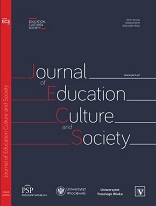Theoretical Background for a Strategy of Development of Cultural Literacy in Schools
Theoretical Background for a Strategy of Development of Cultural Literacy in Schools
Author(s): Giorgi KobakhidzeSubject(s): Education, Inclusive Education / Inclusion, Sociology of Education
Published by: Fundacja Pro Scientia Publica
Keywords: literacy;cultural literacy; cultural literacy development strategy;
Summary/Abstract: Aim. Based on the analysis of two social-cultural cases (Lithuania and Georgia), the aim of the research is to reveal the necessity to create a strategy for the development of cultural literacy in schools; to examine the corpus of theory that deals with the concept of cultural literacy and based on the analysis of the latter to suggest a hypothesis for the development of cultural literacy. Methods. The theoretical literature review (i.e., its relevance in academic discourse and international organisations as well as individual countries) has helped to establish the already existing definitions of the concept of cultural literacy, their interaction and to develop a new hypothesis to be tested for the development of cultural literacy in schools. Results and conclusion. The literature review has shown that representatives of different theories offer different definitions of cultural literacy, although there is a common theoretical line on the basis of which I offer to the reader my own structure of cultural literacy development strategy. The analysis of historical and geographical contexts of Lithuania and Georgia has revealed that nowadays even small countries’ society, with a dominant single nation, in some ways can be considered as a multicultural society. Schools in the said countries have become an intercultural place of learning, where reemigrants, migrants, ethnical minorities and locals are brought together. The analysis has led to the conclusion that taking into account modern challenges, the importance of the development of cultural literacy in schools is growing both for international organisations and for individual countries. The concept of cultural literacy is considered value-based knowledge, which comes as a response to the requirements of society’s sustainable coexistence.
Journal: The Journal of Education, Culture, and Society
- Issue Year: 12/2021
- Issue No: 1
- Page Range: 48-58
- Page Count: 11
- Language: English

